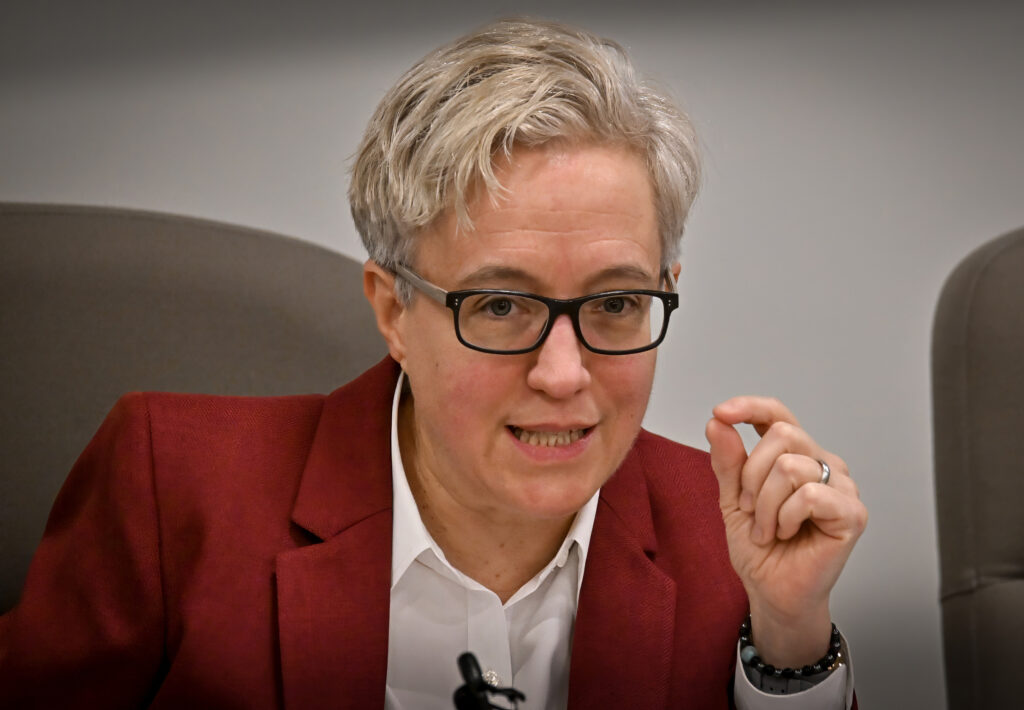Politics
Oregon Governor Proposes Gas Tax Hike to Fund Transportation

Governor Tina Kotek has unveiled a comprehensive transportation funding plan that includes a proposed increase of six cents to the state gas tax. This initiative aims to prevent layoffs at the Oregon Department of Transportation and local governments across the state. During a press conference on January 16, 2025, Kotek outlined her strategy, which also encompasses hikes in vehicle registration fees and a doubling of the payroll tax that supports transit projects.
The governor’s announcement follows her decision to postpone planned layoffs for an additional 45 days, while she has called lawmakers back for a special session scheduled for August 29, 2025. “I am confident that next month, legislators are going to show up, they’re going to approve the necessary funding for the state’s transportation needs,” Kotek stated, expressing appreciation for their collaboration in addressing Oregon’s pressing transportation crisis.
In her proposed plan, the state gas tax would rise from 40 cents to 46 cents per gallon. The revenue generated would be allocated as follows: 50% to the state transportation department, 30% to Oregon’s 36 counties, and 20% to cities. Additionally, Kotek has proposed a $42 increase in vehicle registration fees, which currently range from $126 to $156, depending on a vehicle’s age and fuel efficiency.
Electric vehicle owners would see a new $30 supplemental registration fee, bringing their total registration cost to $316 for a two-year period. The plan also includes a $139 increase in the state’s title fee, which currently varies between $101 to $116 for gasoline-powered vehicles and $192 for electric vehicles. Furthermore, the payroll tax for transit would be doubled from 0.1% to 0.2%.
Kotek has also committed to implementing a per-mile charge for electric vehicles and hybrids in the coming years. She aims to repeal references to tolling from a 2017 transportation package, which included plans for tolling to fund road improvements, such as those on Interstate 205. Kotek has currently imposed a moratorium on tolling, with the exception of a replacement bridge on Interstate 5 connecting Oregon and Washington.
Criticism of Kotek’s proposed special session came swiftly from Republican legislative leaders. Senate Minority Leader Daniel Bonham expressed concerns that Democrats had not fully considered alternative funding proposals that involved cutting spending elsewhere. “Just weeks after the Legislature rejected the largest tax increase in Oregon history, the governor is calling us back to Salem to try again, this time with less notice and less transparency,” Bonham stated.
Despite the backlash, Kotek remains optimistic about garnering the necessary support for her bill in the Legislature. For tax increases to pass, she requires approval from 36 representatives in the 60-member House and 18 senators in the 30-person Senate. While she has not specified which Republicans may support her plan, Kotek has dismissed suggestions that the state should reduce expenditures from other areas to fund transportation, especially given anticipated federal budget cuts.
“It would be imprudent for us to take those dollars for transportation while we have a predictable, traditional way to fund it,” Kotek remarked. Additionally, she rejected Bonham’s proposal to cut costs by reversing her 2024 executive order mandating union labor on many state construction projects, asserting that this issue is separate from the essential funding of basic services.
The upcoming special session on August 29 coincides with the state’s next quarterly revenue forecast, which should provide lawmakers with a clearer understanding of the impacts of tariffs and potential federal funding cuts. Kotek emphasized that discussions surrounding the general fund and its implications would be distinct from the transportation funding discussions. “I do believe, and mostly because of federal budget cuts, that we will be having a general fund conversation going into the next year’s session,” she stated, underlining the urgency of addressing the state’s transportation funding needs.
-

 Entertainment2 months ago
Entertainment2 months agoIconic 90s TV Show House Hits Market for £1.1 Million
-

 Lifestyle4 months ago
Lifestyle4 months agoMilk Bank Urges Mothers to Donate for Premature Babies’ Health
-

 Sports3 months ago
Sports3 months agoAlessia Russo Signs Long-Term Deal with Arsenal Ahead of WSL Season
-

 Lifestyle4 months ago
Lifestyle4 months agoShoppers Flock to Discounted Neck Pillow on Amazon for Travel Comfort
-

 Politics4 months ago
Politics4 months agoMuseums Body Critiques EHRC Proposals on Gender Facilities
-

 Business4 months ago
Business4 months agoTrump Visits Europe: Business, Politics, or Leisure?
-

 Lifestyle4 months ago
Lifestyle4 months agoJapanese Teen Sorato Shimizu Breaks U18 100m Record in 10 Seconds
-

 Politics4 months ago
Politics4 months agoCouple Shares Inspiring Love Story Defying Height Stereotypes
-

 World4 months ago
World4 months agoAnglian Water Raises Concerns Over Proposed AI Data Centre
-

 Sports4 months ago
Sports4 months agoBournemouth Dominates Everton with 3-0 Victory in Premier League Summer Series
-

 World4 months ago
World4 months agoWreckage of Missing Russian Passenger Plane Discovered in Flames
-

 Lifestyle4 months ago
Lifestyle4 months agoShoppers Rave About Roman’s £42 Midi Dress, Calling It ‘Elegant’









